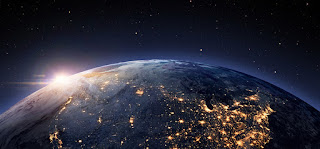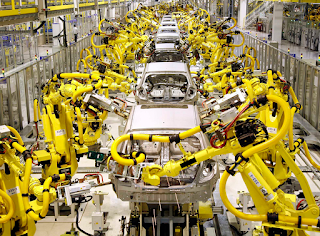Week 6- BioTech + Art
 |
| Alba the Fluorescent bunny |
Again, this week was super
interesting to me as it discussed the way BioTech and art interact in our
modern society. This week’s lecture gave
me a clearer understanding of the role Biotechnology has within art, but not
only that, how it is integrated into our society through the use of
animals. The most interesting part of
the lecture was the discussion of Alba the fluorescent bunny, and its
scientific trials that could change the face of medicine in the human body.
Alba was injected with the
jellyfish bioluminescent genes as a fertilized egg, meaning that its genes were
now basically glow in the dark. This experiment, included artist working
directly with biologists, geneticists and neuroscientists to inject the flesh
of an animal and I believe that we benefit from there finding more than anyone
would know. This was a very beneficial
experiment as we can see that scientists could use this experiment in humans by
injected different genes. The scientists could then see the movement of genes
in the human bodily system that they never though possible. Along with this,
scientists could also hopefully attach the bioluminescent gene to cancerous
genes or traits and see the movements of the destructive cells. This could lead
to earlier detection of cancers in the human race, and maybe even prevent some
from becoming detrimental to some.
 |
| Eduardo Kac |
Another interesting part of
the lecture I thought was the introduction to Eduardo Kac and his work as
transgenic Art. I realise that there was a lot of resistance to his work with
animals in art, however what I also believe is that the resistance groups do
not understand that these works of art are purposeful due to there interactions
with science and what they do for the field.
When his work was reported as scientific, you can see the purpose behind
it and its links in helping to fight cancer.
 |
| Animal Rights activists groups |
This week was a great
example of how art, biotechnology, math, science, technology and medicine all
work together to produce a better world for us to live and participate in.
"A critique of animal
rights ideology." Libcom.org. N.p.,
n.d. Web.
“Biotech Art – We Make
Money Not Art.” We Make Money Not
Art, we-make-money-not-art.com/category/biotech-art/.
"Bioart through Evolution:
George Gessert." Revolution
Bioengineering. N.p., n.d.
ChicagoHumanities. “Eduardo
Kac: Transgenic Artist.” YouTube,
YouTube, 9 Dec. 2013, www.youtube.com/watch?v=3LSJVD0m1Mg.
"Eduardo Kac:
Biological Art." Eduardo Kac:
Biological Art | digitalarti.com. N.p., 30 Apr. 2013.
Green Fluorescent Protein - Cool Uses - Alba. N.p., n.d. Web
UNESCO Arts, Science &
Technology, digitalarts.lmc.gatech.edu/unesco/biotech/artists/bio_a_ekac.html.
Vesna, Victoria.
Lecture. Biotechnology and Art pt. 1
Video. University of California, Los Angeles, May 7, 2018


I have never really thought about the connection between art and biotechnology. It is pretty interesting for me to see this because I usually think of genetic modification being some scientists in a lab, but many of them really are artists in their own way. I think that your blog did a good job of highlighting this. Also, I found it interesting that you included the bit at the end defending the scientists. Sure, sometimes the work humans do is cruel, but sometimes it is absolutely necessary in order to develop in our research of things like cancer. I really enjoyed reading and cannot wait to read next week :)
ReplyDeleteHey Bronte,
ReplyDeleteI really enjoyed your post this week. I too commented on the fascinating scientific experiment of Alba the glowing bunny. I completely agree that this can lead to several breakthroughs in the medical and scientific fields when applied to human beings and their gene makeup. Great post!